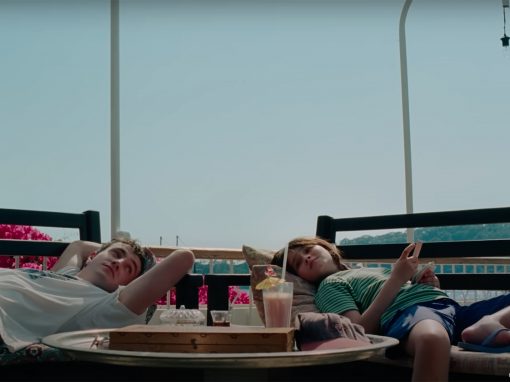I caught about 30 films at TIFF, and will be writing a piece on the festival for the next issue of LOLA. Meanwhile, here’s a quick personal summary evaluation:
Best-of-Fest:
Far From Vietnam (Marker/Godard/Varda/Resnais/Ivens/Klein/Lelouch, France, 1967)
Leviathan (Castaing-Taylor/Paravel, France/UK/USA)
Excellent:
Like Someone in Love (Abbas Kiarostami, Japan/France)
Frances Ha (Noah Baumbach, USA)
Passion (Brian De Palma, France/Germany)
Barbara (Christian Petzold, Germany)
Strong:
In Another Country (Hong Sang-soo, South Korea)
Tabu (Miguel Gomes, Portugal)
Viola (Matías Piñeiro, Argentina)
Sightseers (Ben Wheatley, UK)
The Pervert’s Guide to Ideology (Sophie Fiennes, UK)
The Girl from the South (José Luis Garcia, Argentina)
Nights with Theodore (Sébastien Betbeder, France)
When Night Falls (Ying Lang, China)
Walker (Tsai Ming-Liang, Taiwan)
Fascinating, but I had reservations:
The Last Time I Saw Macao (Rodrigues/da Mata, Portugal)
Room 237 (Rodney Ascher, USA)
Still pondering:
Night Across the Street (Raúl Ruiz, France/Chile)
The Capsule (Athena Rachel Tsangari, Greece)
Disappointments:
Fill the Void (Rama Burshtein, Israel)
Spring Breakers (Harmony Korine, USA)
Gebo and the Shadow (Manoel de Oliveira, Portugal)
The Tortoise, An Incarnation (Girish Kasaravalli, India)
Berberian Sound Studio (Peter Strickland, UK)
All That You Possess (Bernard Émond, Canada)
Links to recent reads:
— For your TIFF coverage needs: Cinema Scope magazine; David Hudson’s Keyframe Daily; MUBI Notebook; and Blake Williams’ TIFF super-post. Also: David Bordwell’s account of attending industry and filmmaker panels at the festival.
— Great amounts of reading: new issues of Screening the Past (helpfully rounded up by Catherine Grant); Cinema Scope; Film Comment; Senses of Cinema; Screen Machine; and World Picture.
— Far From Vietnam (1967), the single best film I encountered at TIFF, is notoriously hard to see. I knew this going in, resolved to take notes to keep the film in my memory, then got caught up in its riveting, heterogeneous images and quick pace. And so I’m glad to discover Thomas Waugh’s visual essay at Jump Cut that brings the images back to me.
— Jonathan Rosenbaum on Ray Carney in a 2001 piece for Cineaste which reviewed five books on John Cassavetes: “…no critical monopoly can ever be healthy, no matter how conscientious, thoughtful, or thorough the monopolist.”
— At Art of the Title: an interesting interview-post with video clips on the title sequences of David Fincher’s films.
— Several recent reviews by Ignatiy Vishnevetsky at MUBI.
— Mark Le Fanu on Boris Barnet at the BFI website.
— Phil Coldiron’s piece at Moving Image Source: “Shooting on 16-millimeter in a digital age”.
— Andrew Klevan and Alex Clayton respond to a negative review by Warren Buckland of their film criticism essay collection. Buckland’s review is unavailable to read for free online.
— An essay on cinephilia by Sam Roggen at the Belgian website Photogénie.
— An interview with Brian De Palma on “the art, the technology, and the ethics of watching”.
— via Matt Zoller Seitz: a blog post comparing the images of Ozu and Edward Hopper.
— At Film International: Gwendolyn Audrey Foster on capitalism, gluttony, hoarding, waste, excess consumption and film.
— Just discovered This Long Century, a fascinating website that collects, from artists, authors, filmmakers, musicians, etc., “such intimate work as sketchbooks, personal memorabilia, annotated typescripts, short essays, home movies and near impossible to find archival work.”
pic: Barbara (Christian Petzold, 2012).



Anonymous
September 21, 2012 at 5:50 pm
Could you share your thoughts about De Palma's Passion? I watched at Venice 69 and I really didn't like it at all. Just curious about your feelings.
girish
September 21, 2012 at 6:08 pm
Hi, Gekko. I'll be writing about it at LOLA soon, but let me simply say [with a SPOILER ALERT for those who haven't yet seen it] that one of the things I admired about the De Palma was that despite being mostly faithful in narrative and incident to the Alain Corneau, all the changes from the original were very personal and revealing, e.g. the change of the alibi from a film performance to a dance performance; and the "epilogue" section which doesn't exist in the Corneau. I look forward to expanding on this in the LOLA piece. PASSION was one of the most talked about films in Toronto (both for and against — mostly against).
Peter Nellhaus
September 21, 2012 at 6:36 pm
I may refer to your assessment in choosing films to cover at the Starz Denver Film Festival. That schedule won't be revealed until October 15. I am disappointed with the coverage of TIFF that I've seen as it was mostly about the high profile titles that for the most part have scheduled theatrical release dates, as well as future art house fare like Rust and Bone. I found one capsule review of English Vinglish tossed off at IndieWire. The Thieves, closing in on The Host as Korea's biggest hit, was ignored. I am glad that with Pieta, Kim Ki-duk is getting commercial traction on his home turf.
girish
September 21, 2012 at 6:42 pm
Peter, I was shut out of just two films that I wanted to see at TIFF: MUSEUM HOURS (by Jem Cohen) and ENGLISH VINGLISH. The latter was a *huge* draw for the local Indian population in Toronto. Alas, I'll have to wait for DVD.
Unknown
September 21, 2012 at 9:51 pm
It's kind of funny you linked to a piece by Rosenbaum on Ray Carney. Have you come across this item on Carney recently?
http://fablog.ehrensteinland.com/2012/09/06/ray-carney-stop-thief/
I mean, I don't know if it's super-legit… but I have a strong feeling it is, and it makes me lose my respect for Carney even more.
girish
September 21, 2012 at 9:56 pm
Unknown, also check out the two recent posts titled "Chained Relations" at filmmaker Jon Jost's blog.
Anonymous
September 22, 2012 at 6:32 am
I went to only a few screenings from the Wavelengths program, and Tabu is the only one I watched in your list. What did you think about the film?
I felt the stylistic construction of the present time was more fragmented (and interesting) than that of the past. The theme and use of locality in the second part engendered contrasts against the first part at various level so the film maintained a curious tension overall.
girish
September 22, 2012 at 10:36 am
I liked TABU a lot. An interesting Q&A with Gomes as well. I think you and I had opposite takes on the film. I had some difficulty with the first part (designed to be more "banal" and verbal, it wore on me a little), but absolutely loved the second part, which was a self-consciously "cinematic" world. Gomes spoke a bit in the Q&A about the system of contrasts between the first and second parts of the film.
Jonathan Rosenbaum
September 22, 2012 at 11:30 pm
Hi Girish,
I'm curious to hear what some of your reservations were regarding The Last Time I Saw Macao, which in many ways was my favorite among the films I saw in Toronto.
Thanks!
girish
September 23, 2012 at 5:07 pm
Hi, Jonathan! It's good to hear from you.
I felt that of the three components of the film (noir; city symphony; essay film), the first was "thin" and unpersuasive and never really clicked into place for me. Which distracted me from appreciating the other two components (which were both much more interesting). It's possible that I had a "quirky" reaction, and so I definitely want to revisit the film to see if I can get past my block. The closing minutes of the film were absolutely breathtaking.
The only other work I've seen by Rodrigues is TO DIE LIKE A MAN, which I loved, and was my favorite film at TIFF '09.
Jonathan Rosenbaum
September 24, 2012 at 4:26 am
Wow. Based on that recommendation, I've just ordered a copy….The only other Rodrigues film I've seen is the much earlier O FANTASMA, almost a decade ago, which I found striking and Genet-like but (according to my capsule review at the time) less of a knockout than the new film.
Adrian
September 24, 2012 at 3:32 pm
The knockout Rodrigues film, in my experience, is ODETE (aka TWO DRIFTERS, 2005). From the first shot, it grips you – he is a sensational filmmaker.
girish
September 24, 2012 at 3:35 pm
Jonathan, Adrian — I've seen neither O FANTASMA nor ODETE, and look forward to doing so.
Adrian
September 25, 2012 at 4:52 am
For Spanish-readers, here is a brilliant essay on 3 Rodrigues films by the great Cristina Álvarez López, who introduced this work to me: http://transitcine.es/text/cristina-lvarez-lpez/anunciar-el-destino-desafiar-al-misterio-acudir-a-la-llamada/117
girish
September 25, 2012 at 10:52 am
Adrian, speaking of Transit, really enjoyed your just-posted piece on Garrel's Un été brûlant.
girish
September 26, 2012 at 10:46 am
(via Rosalind Galt) The Cinémathèque française has a memorial tumblr for Chris Marker.
girish
September 26, 2012 at 11:20 am
A 3-day conference on Werner Schroeter begins at Boston University tomorrow.
charro
October 3, 2012 at 5:06 am
Issue 02 of Desistfilm is now online!
http://desistfilm.com/category/issue-02/
girish
October 3, 2012 at 5:03 pm
Thanks for that, charro!
Since I put up the post, Warren Buckland's negative review of the Klevan/Clayton collection has now been posted online.